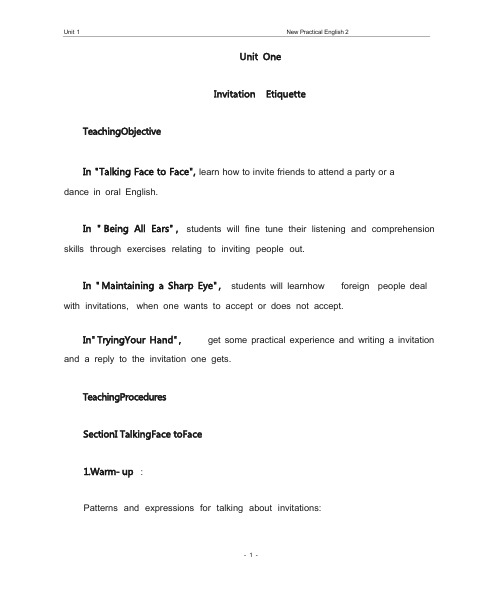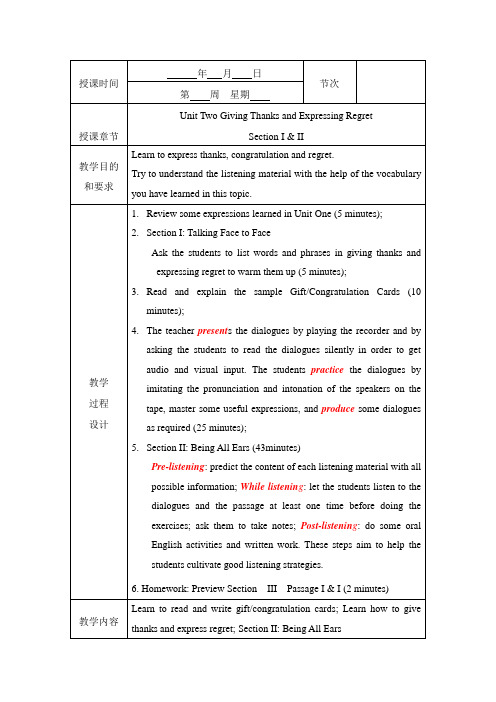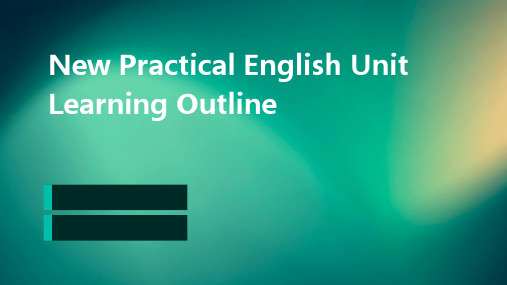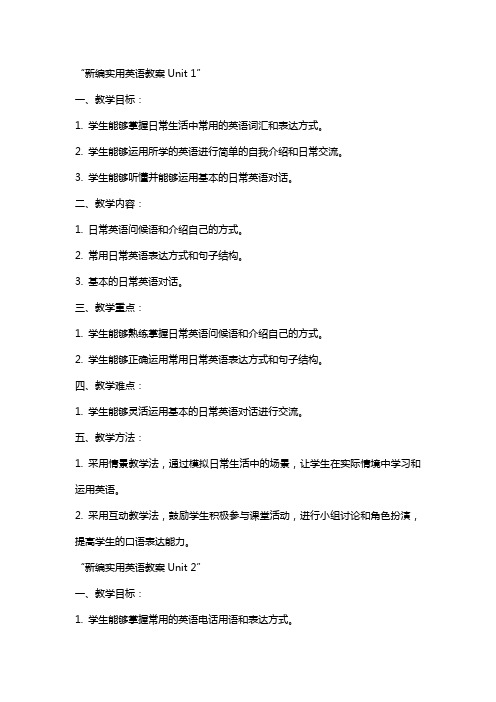新编实用英语教案unit
新编实用英语综合教程2unit_1_教案

learn how to invite friends to attend a party or adance in oral English.students will fine tune their listening and comprehensionskills through exercises relating to inviting people out.students will learnhow foreign people dealwith invitations,when one wants to accept or does not accept.get some practical experience and writing a invitationand a reply to the invitation one gets.:Patterns and expressions for talking about invitations:I’dliketoinviteyoutodinner.我想请你吃晚饭。
Why don’t you come and join us for disco?你为什么不和我们一起跳迪斯科?It’s very kind of you to invite me.谢谢你邀请我。
How nice of you! Many thanks.你真好!多谢。
I’dlove to. That wouldbe grea t.我很愿意去。
太好了!Oh, dear, I’m afraid I’m busy tonight. Perhaps tomorrow evening?哦,亲爱的,今晚我很忙。
明晚也许可以吧?Could you make it another time, perhaps next Sunday?你能改个时间吗,下个星期天怎样?It’s very kind of you, but you see I’ll have to prepare for my exam.非常感谢,可你知道我得准备考试。
new practical English Unit 1 教学设计

收集更多关于美国的礼仪文化
彩纸
20分
归纳与
综合训练
总结美国的礼仪文化
1.流畅的朗读课文
2.根据课文回答问题
3.做练习P9.4
1.部分学生朗读课文.
2.根据课文回答问题
5分
总结与讲评
讲评本单元课文听、说、读、写
写邀请信、邀请卡等注意事项
修正邀请信,揣摩语言行为方式
作 业
1.搜集、掌握更多有关美国的礼仪文化。
1) accept(v.)—acceptance(n.)
2) decline—accept(antonymy.)
3) refuse(v.)—refusal(n)
2.综合训练
1)流畅的朗读课文
2)根据课文回答问题
3)复述课文
4)总结美国人的邀请习俗
专业:班级:
高教社《新编实用英语》第二册第一单元教案
课题:Unit 1 Section III An Invitation Letter(Passage II)
高教社《新编实用英语》第二册第一单元教案
课题:Unit 1 Section III Are You Really Being Invited?(Passage I)
(第一单元第三部分)你真的被邀请了吗?
授课
班级
上课
时间
周 月 日 第 节
上课
地点
教
学
目
的
通过本节课的学习,让学生学会用英语邀请人们参加日常活动、参加正式活动,通过表示邀请的英语词汇、短语、句型的搜集,使学生了解美国人的邀请习俗。
2.完善邀请信、卡的设计。
课后体会
PRACTICAL TASK PAPER
《新编实用英语》教案第一册Unit2

Unit TwoGiving Thanks and Expressing RegretI. Objectives:By the end of this unit, the students should be able to1) read, discuss and translate gift cards and congratulation cards in English,2) learn some expressions used in giving thanks and expressing regret,3) comprehend the two passages and master the useful expressions in them, and4) finish the exercises by themselves or with some help.II. IntroductionLead-in(导入): First, the students are asked to list words and phrases in giving thanks and expressing regret to warm them up. Then what they have shouted out is written down on the blackboard. Finally, the introductory remarks will be made by the teacher as follows:Thank-you notes, congratulation cards and letters of apology are useful for expressing thanks, good wishes and apologies on some social occasions. Also, it is important to learn to reply to them properly.III. Teaching Procedures:Section I. Talking Face to FaceStep 1. Presentation:Read the following samples of a gift card as well as its rely. Sample 1 A Gift CardReply to the gift sender:Sample 2. A Congratulation CardThe conversational formulae in giving thanks and expressing regretExpressing Thanks 致谢1) I appreciate it.我非常珍惜您的帮助。
新编实用英语第一册教案Unit1 A

--- How about going to a ball tonight?
--- I will if I can.
--- Would you like to go roller skating with me this Saturday afternoon?
The teacher asks students to make more sentences that are used for making an invitation and giving a reply to it.
--- May I invite you to attend our debate?
用学过的句型讨论一次正式或非正式的邀请。
教学手段
Student-oriented communicative teaching, free discussion and interaction; oral training and student’s report and presentation and multimedia
第三步:
对话(讲授法&练习法)
时间:45分
利用多媒体课件讲解对话并做练习:
自编对话表演。
PPT演示
或
板书展示
第四步:
生词&词组
(讲授法)
时间:10分
PPT展示或Βιβλιοθήκη 板书展示课后
小
结
公司报告其利润略有减少。
2.drag v.pull sb./sth. along with effort and difficulty拖,拉,拽,扯
《新编实用英语》Unit

Critical thinking and interpretation
Evaluating the author's arguments and claims, as well as offering personal interpretations and insights
05 Listening training
Explaining important words and phrases, as well as grammatical structures used in the text
Main ideas and supporting details
Identifying the central themes and ideas, as well as the supporting evidence and examples provided
新编实用英语教案Unit

“新编实用英语教案Unit 1”一、教学目标:1. 学生能够掌握日常生活中常用的英语词汇和表达方式。
2. 学生能够运用所学的英语进行简单的自我介绍和日常交流。
3. 学生能够听懂并能够运用基本的日常英语对话。
二、教学内容:1. 日常英语问候语和介绍自己的方式。
2. 常用日常英语表达方式和句子结构。
3. 基本的日常英语对话。
三、教学重点:1. 学生能够熟练掌握日常英语问候语和介绍自己的方式。
2. 学生能够正确运用常用日常英语表达方式和句子结构。
四、教学难点:1. 学生能够灵活运用基本的日常英语对话进行交流。
五、教学方法:1. 采用情景教学法,通过模拟日常生活中的场景,让学生在实际情境中学习和运用英语。
2. 采用互动教学法,鼓励学生积极参与课堂活动,进行小组讨论和角色扮演,提高学生的口语表达能力。
“新编实用英语教案Unit 2”一、教学目标:1. 学生能够掌握常用的英语电话用语和表达方式。
2. 学生能够运用所学的英语进行电话交流。
3. 学生能够听懂并能够运用基本的日常英语对话。
二、教学内容:1. 常用英语电话用语和表达方式。
2. 电话交流的基本步骤和注意事项。
3. 基本的日常英语对话。
三、教学重点:1. 学生能够熟练掌握常用英语电话用语和表达方式。
2. 学生能够正确运用电话交流的基本步骤和注意事项。
四、教学难点:1. 学生能够灵活运用基本的日常英语对话进行交流。
五、教学方法:1. 采用情景教学法,通过模拟电话交流的场景,让学生在实际情境中学习和运用英语。
2. 采用互动教学法,鼓励学生积极参与课堂活动,进行小组讨论和角色扮演,提高学生的口语表达能力。
“新编实用英语教案Unit 3”一、教学目标:1. 学生能够掌握常用的英语购物用语和表达方式。
2. 学生能够运用所学的英语进行购物交流。
3. 学生能够听懂并能够运用基本的日常英语对话。
二、教学内容:1. 常用英语购物用语和表达方式。
2. 购物交流的基本步骤和注意事项。
新编实用英语第二册Unit 1教案
Unit One InvitationsSession one:Teaching ProceduresStep1 Lead-in: The invitation card1 Warm-up questions:1)What are the two cards you are reading now?2)Why do people write an invitation card?2 Questions for understanding the first invitation card1) Who are the inviters?2) Why are they going to hold a dinner party?3) When are they going to hold a dinner party?4) Where will the dinner party be held?3 Questions for understanding the second invitation card1) Who is the inviter?2) Who is the person invited?3) What activity is going to take place?Step2 Oral Activities: Talking Face to Face1 The teacher asks some questions and the Ss speak out the sentences for certain purposes under the guidance of the teacher.1) Do you know how to make an invitation?2) Do you know how to decline an invitation?2 The Ss read the sample dialogues after the teacher and try to find out the useful sentences and expressions for making and declining an invitation in the dialogues.3 The Ss practice the dialogues in groups.4 Give the Ss several minutes to prepare short conversations in pairs by simulating the five small dialogues.5 The Ss role-play the similar situations they create, first in groups and then in front of theclass.6 The Ss do Put-in-Use exercises in groups by reading out loud all the three dialogues they have completed.Step3 Listening Practice: Being All Ears1 Give the Ss a few minutes to read through the printed materials for each listening item.2 Listen to the tape for the first time without looking at the book.3 Play the tape for a second time with a pause after each sentence, and ask the Ss to take notes of the key words.4 Play the tape for the third time, and ask the Ss to simultaneously repeat the passage while they are listening.5 Do all the exercises in this section.Step4 Assignments1 Pair work: Prepare conversations about making and declining an invitation.2 Recite the wonderful sentences picked out by the teacher.3 Preview all the exercises after Passage 1.说明:教师其他补充内容部分,教师可根据实际情况填写,如果内容过多可以写在教案背面;授课总结根据实际授课情况,简单说明即可。
新编实用英语综合教程(第四版)Unit-2教案
江西外语外贸职业学院教案备课纸〔2〕江西外语外贸职业学院教案备课纸〔3〕主任审阅____________________ 授课教师____________________ 年月日年月日江西外语外贸职业学院教案备课纸〔4〕授课内容Unit 2Section I Talking Face to FaceThe topic of talking face to face area in this unit is to express thanks and give responses while exchanging gift-card and congratulation card. The focus is on the patterns that are appropriate for giving information concerning the various reasons and hoping to get the forgiveness from the other person.1. The students read the mini-talks after the teacher, and then try to recite them within five minutes in pairs.2. Ask the students to underline the useful expressions and perform the mini-talks in class.3. The students discuss in groups, summarizing the words, phrases and sentences frequently used according to the following topics with the help of the teacher. The students speak out the sentences under the guidance of the teacher, paying attention to the pronunciation and the intonation.1) sentences frequently used for expressing thanks:It was so generous of you to send me such a fine and beautiful gift.I don’t know how to express my thanks to you.I’m grateful for all the help and encouragement you’ve given me.2) Sentences frequently used for expressing congratulations:Congratulations on your recent promotion!Please accept my heartiest congratulations.江西外语外贸职业学院教案备课纸〔3〕主任审阅____________________ 授课教师____________________ 年月日年月日江西外语外贸职业学院教案备课纸〔4〕授课内容Unit 2Section Ⅱ Being All Ears1. Give the students a few minutes to read through the printed materials for each listening item.2. Listen to the material for the first time without referring to the book.3. Listen to the material for a second time, and ask the students to answer the following questions orally.1) What is the relationship between Andy and Donna?2) What happened to Donna? How does she feel now?3) Why does Donna show her thanks to Andy?4) Where does Andy get the flowers?5) Where does Donna keep the flowers?江西外语外贸职业学院教案备课纸〔3〕主任审阅____________________ 授课教师____________________ 年月日年月日江西外语外贸职业学院教案备课纸〔4〕授课内容Section Ⅲ Trying Y our HandApplied WritingSample AnalysisThe teacher summarizes briefly the format and language used in thank-you notes, congratulation cards and apology letters. The teacher may show the following passage with PPT. Afterwards, ask the students to read it and translate it into Chinese orally. 1.More information about thank-you notes;Thank-you notes are usually exchanged between friends and acquaintances. They are brief, direct and often in an informal style. They are often written in simple languages, using courteous words and sentences to express the writer’s good wish or thanks. The following sentences are often used in thank-you notes.2.More information about congratulation cards:People often write and send a congratulation card to congratulate one on such joyful occasions as celebrating one’s promotion, wedding, birthday, graduation, etc. Congratulation cards are also exchanged on holidays. The language used in a congratulation card usually sounds courteous and complimentary. The following expressions and sentences often appear in congratulation cards.Grammar3.Assignment for this sectionWritten work: suppose you missed an appointment with your friend. Please write a letter of apology for his/her forgiveness.江西外语外贸职业学院教案备课纸〔3〕主任审阅____________________ 授课教师____________________ 年月日年月日江西外语外贸职业学院教案备课纸〔4〕授课内容Unit 2Section Ⅳ(1): Passage 1 Thank you, Volunteers!rmation Traditional Festivals in China.春节:Spring Festival ( the 1st day of the 1st lunar month)除夕:New Year’s Eve ( the day before the Spring Festival)元宵节:Lantern Festival ( the 15th of the 1st lunar month)清明节:Qingming/Tomb-Sweeping Festival (April 4th or 5th)端午节:Dragon Boat Festival( the 5the of the 5th lunar month)七夕节:Qixi Festival( the 7th day of the 7the month of the lunar month, somewhat equivalent to Valentine’s Day in English)中秋节:Mid-Autumn Festival( the 15th of the 8th lunar month)重阳节:Double-Ninth Day ( the 9th of the 9th lunar month)2.Important Traditional Festivals in Western Countries.圣诞节:Christmas( the 25th of December)平安夜: Christmas Eve ( the 24th of December)情人节:Valentine’s Day ( 14th of February)愚人节:Fool’s Day ( the 1st of April)复活节:Easter( the 1st Sunday after a full moon on or after 21st of Marth)感恩节:Thanksgiving Day ( the 4th Thursday f November)万圣节:Halloween/All Saints’ Day (31st of October)Important words1.offerv. make available or accessible, provide or furnishe.g. The conference center offers a health spa.The local student offers to guide us around the city.2. invitev. ask someone in a friendly way to do somethinge.g. Shall we invite the famous football player to join our club?Students are invited to submit papers to this online magazine.3. gratefula. feeling or showing thankse.g. He felt so grateful to all the strangers’ help.We need to feel more grateful for what we have instead of complaining what we don’t.4.breakn. a pause from doing something ( as work)e.g. The meeting was too long, so we had a tea break.A 10-minute break between each session offers us a time to rest a bit.5. appreciatev. be fully aware of;; realize fullye.g. Do you appreciate the full meaning of this letter?I do appreciate what you have done to ease my pain.6. recognizev. show approval or appreciation ofe.g. Our effort is fully recognized by the society.The in-service training center is widely recognized here.江西外语外贸职业学院教案备课纸〔3〕主任审阅____________________ 授课教师____________________ 年月日年月日江西外语外贸职业学院教案备课纸〔4〕授课内容Unit 2Section Ⅳ(2): Passage 1 Thank you, Volunteers!Language pointsExplanation of Difficult Sentences1. (Para. 1)November in the United States brings the holiday of Thanksgiving, and therefore it’s in November that we tend to think of a way in which we could show our thanks to volunteers.Analysis: This is a complex sentence. The basic sentence structure is S(subject) and S in which…In the second and-clause an emphatic structure it’s inNovember is used to emphasize the time adverbial of in November,modifying we tend to think. Which leads a relative clause, modifyinga way.Translation: 因此,我们在十一月里常常会想方法来表示对志愿者们的感谢。
新编实用英语综合教程1第五版教案unit7
Unit 7: Living in the FuturePart 1: Introduction1.1 Overview of the UnitIn Unit 7, we will explore the theme of "Living in the Future." This unit will focus on discussing various aspects of future life, including technological advancements, environmental issues, and societal changes. We will engage in discussions, debates, and presentations to enhance our English language skills while delving into thought-provoking topics.1.2 Learning ObjectivesBy the end of this unit, students should be able to:- Discuss the potential impact of technology on future living - Analyze and discuss environmental challenges and solutions - Debate societal changes and their implications- Deliver a presentation on a future-oriented topicPart 2: Vocabulary and Language Functions2.1 Key VocabularyThis section will introduce new vocabulary related to future living, such as technological terms, environmental terms, and words related to societal changes. Students will practice usingthe new vocabulary in various exercises and activities to enhance their language proficiency.2.2 Language FunctionsIn this section, students will learn and practice language functions that are essential for discussing future scenarios, such as making predictions, expressing possibilities, and speculating about the future. Through interactive exercises, students will be proficient in using these language functions in both spoken and written contexts.Part 3: Reading and Comprehension3.1 Reading TextsThe unit will include a variety of reading texts that focus on different aspects of living in the future. These texts may cover topics such as futuristic technology, sust本人nable living, or societal trends. Students will engage in readingprehension activities to enhance their understanding of the texts and develop their critical thinking skills.3.2 Discussion QuestionsFollowing the reading texts, students will participate in group discussions based on thought-provoking questions related tothe readings. These discussions will encourage students to express their opinions, support their arguments with evidence from the texts, and engage in constructive dialogue with their peers.Part 4: Speaking and Listening4.1 Speaking ActivitiesThis section will provide opportunities for students to engage in various speaking activities, such as role-plays, debates, and group discussions. By actively participating in these activities, students will improve their speaking skills, fluency, and ability to articulate their thoughts on future-oriented topics.4.2 Listening ComprehensionStudents will listen to audio recordings related to future living andpleteprehension tasks to test their listening skills. These listening activities will expose students to different accents, speech patterns, and conversational styles, thereby enhancing their ability to understand spoken English in real-life contexts.Part 5: Writing and Presentation5.1 Writing TasksIn this section, students will be assigned writing tasks thatrequire them to articulate their thoughts and ideas about future living. These tasks may include opinion essays, argumentative essays, or creative writing exercises that encourage students to showcase their language proficiency and critical thinking skills.5.2 Presentation SkillsStudents will prepare and deliver presentations on future-oriented topics of their choice. This will allow them to demonstrate their public speaking abilities, present information in a clear and organized manner, and engage their peers in constructive discussions about the future.Part 6: Assessment and Evaluation6.1 Formative AssessmentsThroughout the unit, students will be assessed through formative assessments, such as quizzes, class participation, and performance in various activities. These assessments will provide ongoing feedback to students and help them track their progress in mastering the unit's content and language skills.6.2 Summative AssessmentAt the end of the unit, students will be assessed through a summative evaluation, which may include aprehensive test, awritten assignment, and a presentation. This assessment will gauge students' overall understanding of the unit's content and their ability to effectivelymunicate and express their thoughts on future living.Part 7: Extension Activities7.1 Field Trips and Guest SpeakersAs an extension of the unit, students may have the opportunity to participate in field trips to relevant locations, such as science museums, environmental organizations, or technologypanies. Additionally, guest speakers may be invited to share their expertise on future-oriented topics and engage students in discussions and QA sessions.7.2 Project-Based LearningStudents may engage in project-based learning activities that involve researching, designing, and presenting a project related to living in the future. This collaborative, hands-on approach will allow students to apply their knowledge and creativity to real-world scenarios and showcase their skills in a culminating project.In conclusion, Unit 7: Living in the Future will provide studentswith aprehensive and engaging exploration of future-oriented topics, equipping them with the language skills, critical thinking abilities, and global awareness necessary for living and thriving in a rapidly changing world. Through a variety of interactive activities, discussions, and assessments, students will g本人n valuable insights and develop their language proficiency in the context of futuristic themes.。
新编实用英语教案Unit
“新编实用英语教案Unit 1”一、教学目标1. 知识目标掌握常用的英语问候语和自我介绍的表达方式。
学习日常生活中常见的名词和动词。
理解简单的英语句子,提高阅读理解能力。
2. 技能目标能够用英语进行基本的自我介绍和日常交流。
提高听、说、读、写的综合语言运用能力。
培养团队合作和互动交流的能力。
3. 情感目标激发学生学习英语的兴趣和积极性。
培养学生乐观、自信的学习态度。
二、教学内容1. 词汇教学学习常用的英语问候语,如“Hello”、“Good morning”、“Good afternoon”、“Good evening”等。
学习自我介绍的表达方式,如“My name is”、“I e from”、“I am a”等。
学习日常生活中常见的名词和动词,如“name”、“age”、“nationality”、“work”等。
2. 语法教学学习一般现在时和一般过去时的表达方式。
学习常用的句型结构,如“What's your name?”、“Where are you from?”、“What do you do?”等。
3. 阅读教学阅读关于自我介绍的文章,提高阅读理解能力。
学习从文章中获取关键信息,进行简单的推理和判断。
4. 写作教学练习写一篇关于自己基本情况的小短文。
学习使用一般现在时和一般过去时进行写作。
三、教学方法1. 任务型教学法:通过小组合作、角色扮演等形式,让学生在实际情境中运用所学知识。
2. 交际型教学法:通过模拟真实场景,让学生进行听、说、读、写的实际操作,提高综合语言运用能力。
3. 情境教学法:创设情境,让学生在真实的环境中感受、体验和学习英语。
四、教学步骤1. 导入:教师与学生用英语进行问候,营造轻松愉快的课堂氛围。
2. 新课内容:讲解常用的英语问候语和自我介绍的表达方式。
3. 实践环节:学生进行角色扮演,模拟真实场景进行自我介绍。
4. 阅读理解:学生阅读关于自我介绍的文章,回答相关问题。
- 1、下载文档前请自行甄别文档内容的完整性,平台不提供额外的编辑、内容补充、找答案等附加服务。
- 2、"仅部分预览"的文档,不可在线预览部分如存在完整性等问题,可反馈申请退款(可完整预览的文档不适用该条件!)。
- 3、如文档侵犯您的权益,请联系客服反馈,我们会尽快为您处理(人工客服工作时间:9:00-18:30)。
Unit 4 Punctuality and CultureI.Teaching objectives1.Enlarge your vocabulary related to timetables and schedules.2.Make an appointment according to the timetables.3.Practice writing timetables and schedules .4.Appreciate passages and complete exercises well.5.Get some tips about the use of verb tenses.II. Key points1. Master the vocabulary about timetables and schedules.2. Understand the passages3. Practice writing timetables and schedules.4. Practice making an appointment according to the timetables. III. Difficult points1. Get some tips about the use of verb tenses.2. Practice writing timetables and schedules.3. Appreciate passages and complete exercises well.IV. Teaching methodology1.Task-based language teaching2.Direct methodV. Teaching proceduresSection I Talking Face to FaceImitating Mini-Talks1.Work in pairs. Practice the following mini-talks about schedules and timetables.Acting out the Tasks2.Work in pairs and act out the tasks by following the above mini-talks.Key for reference:1)Task:Look at the flight timetable in Exercise 3. Ask about the departure and arrival time.2)Task:Look at the flight timetable in Exercise 3 .Ask about the Tuesday flight for Hong Kong.3)Task: Look at Mark’s schedule in Exercise 3. Call to ask Mark for a change of an appointment.4)Task:Look at Mark’s schedule in Exercise 3. Ask to make an appointment to see Mark on Wednesday.5)Look at Mark’s schedule in Exercise 3. An old friend in Hong Kong asks to see Mark on Thursday .Studying Timetables and Schedules3.Timetables and schedules are important in planning our activities. Read the following timetable and schedual and try to use the information to practice short dialogues.Following Sample Dialogues4. Read the following sample dialogues and try to perform your own tasks. Putting Language to Use5. Mark is going to Harbin to see the Ice Lantern Exhibition. He is asking Miss Wang to help him to find out about the train timetable. Suppose you are Mark. Read aloud the following dialogue with your partner by putting in the missing words.6. Now imagine you are a receptionist in a hotel. Mr. Johnson is asking you about information of your hotel. Fill in the blanks according to the clues given in the brackets. Then act it out with your partner.Section II Being All EarsLearning Sentences for Workplace Communication1.Listen to 10 sentences for workplace communication cross-referenced with their Chinese translations.Script: (e.g) 1). Would you please arrange a meeting for me with Dr. Johnson?2). I’d like to make an appointment to see Mr. Black.3). I’d like to confirm our meeting tomorrow afternoon.4). The train is due to arrive at 9 o’clock, but it has been delayed for one hour.5). I’d like to see you tomorrow if you have time.2.Listen to the following sentences for workplace communication in Column A and match each one with its Chinese version in Column B.3.Listen to 6 sentences for workplace communication and choose their right responses.Handling a Dialogue4.Listen to a dialogue and decode the message by filling in Susan’s schedule according to what you have heard.Understanding a Short Speech/Talk5.Now listen to a short speech/talk and fill up the blanks according to what you have heard.The words in brackets will give you some hints.6.Listen to the speech/talk again and complete the information in Column A with the right choices in Column B.Section III Trying Your HandPracticing Applied Writing1.Fill in the office hours making use of the information in the passage that follows.2.Translate the following schedule into Chinese, using the data bank in the Workbook for reference.3.Write an English schedule for the coming week according to your circumstances.Writing Sentences and Reviewing Grammarplete the following sentences, using the right verb forms.5.Correct the errors in the following sentences.6.Translate the following sentences into English.1)This is the most interesting novel he has ever written.2)The students were still laughing when the teacher came into the classroom.3)I haven’t finished the book yet, so I don’t want to return it to the library.4)Is this the first time you have come to China?5)Even if it rains in the afternoon, I will go downtown with you..6)I didn’t hear what you said just now. I was watching TV.7)I know Mr. Wang is living in Nanjing at the moment.8)The little town lies at the foot of a mountain.Write and Describe a Picture7. Suppose this is your schedule for the coming three days. Write a paragraph of about 100words based on the information given in the schedule. You may start the passage with the sentence: I’ve got a very busy schedule.Section IV Maintaining a Sharp EyePassage onenguage Points:A.Explanation of Difficult Sentences1)One of the cultural differences that tend to annoy Americans has to do with understanding of punctuality.Analysis:Has to do with is a phrase meaning has a special relationship with. It is the predicate of the sentence. That introduces a restrictive relative clause modifying differences.2)Arriving at my office 30 minutes after the appointment , I found a voice message telling me the team was waiting for me in the meeting room. Analysis: Arriving at... is a present participle phrase used as an adverbial of time. Telling me(=that told me)is a present participle phrase modifying message. The team was waiting for me in the meeting room is the object clause of the verb telling with that omitted.3)Being afraid that I had missed the appointment , I hurried in, and found them happily chatting together.Analysis:Being afraid that I had missed the appointment is a present participle clause used as an adverbial of cause. Chatting is a present participle used as the object complement.4)...if you start late you won’t be able to finish the business at hand without running beyound the scheduled ending time.Analysis:If introduces an adverbial clause of condition. Note that the pattern you won’t be able to ...without running beyound means you will... by running beyound...B.Important Words1)punctuality n. the quality of adhering to an appointed time2)pay v. be worth it3)annoy v.to disturb or irritate especially by repeated acts4)punctual a.arriving exactly at the time appointed5)attitude n. a mental state involving feelings, beliefs and values6)behavior n.manner of acting2.Passage Translation3.Read and Think: Answer the following questions according to the passage.4.Read and Complete1)Complete each of the following statements with words or phrases from thepassage.2)Fill in the blanks with the proper words or expressions given below,changing the form if necessary.5.Read and Translate6.Read and SimulatePassage twonguage Points:A.Explanation of Difficult Sentences1)Those traveling or doing business abroad should always find out the answer to this question.Analysis: traveling or doing business abroad (=who travel or do business) is a present parciple clause used as the post-modifier of those.2)It is also supposed etiquette to arrive a little late for a party, which I have never ever understood.Analysis:supposed is a past participle, used as an adjective here. Which introduces a non-restrictive relative clause and which itself refers to the whole main clause.3)... When a bridge or major high way shuts down, there may not be any way to get where you are going.Analysis: the infinitive phrase to get where you are going is the post-modifier of the noun way.4)So I would have to say that I am always early, except when I can’t get there at all, in which case I will call as soon as I know I am going to be late. Analysis: In the object that-clause, except introduces a when- clause, an adverbial clause of time, indicating an exceptional situation. In which case introduces a non-restrictive relative clause,which refers to the exceptional when-clause.B. Important Words1)standard n. a basis for comparison; a reference point agaist which other things can be evaluated2)etiquette n.the formal rules for polite behaviors3)suppose v. to believe especially on uncertain or tentative grounds; used to say what was or is expected or intended to happen4)absolutely ad. completely and in every way5)insult n./v. A remark or action that is offensive or deliberately rude; to offend someone by saying or doing something they think is rude6)case n. an example of a particular situation , problem, etc.2.Passage Translation3.Read and Judge: True/False4.Read and Translate: Translate the following sentences into Chinese.1)按照美国人的标准,巴西人不算守时。
